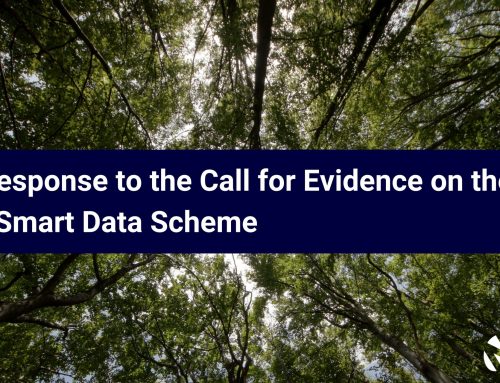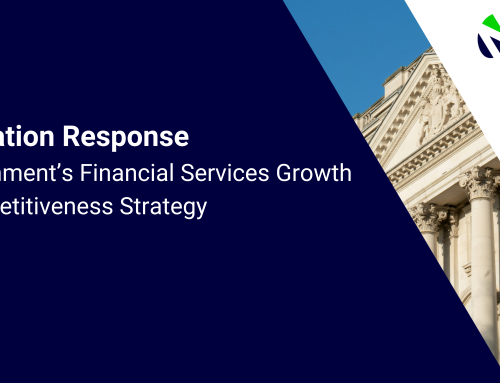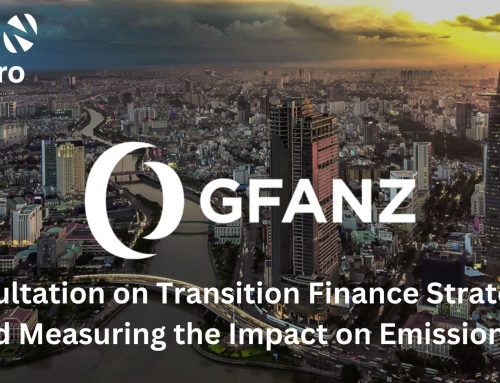The Department for Energy Security and Net Zero (DESNZ) launched a Call for Evidence to gather feedback on the benefits, costs, and practicalities of Scope 3 greenhouse gas emissions reporting in the UK.
Bankers for Net Zero Head of Policy and Public Affairs, Elena Pérez Celis responded to the Call for Evidence. Read some of our responses below.
3.What is your role in relation to company reporting? For example, are you a reporting entity, a company within the supply chain of a reporting entity, an investor and/or a user of accounts, contracted to report on behalf of a reporting entity, part of a consultancy firm, or part of a voluntary reporting scheme?
Bankers for Net Zero is an initiative that brings together banks, businesses and regulators to support the financial sectors transition to net zero in the UK. In 2021, Bankers for Net Zero was announced as the UK Country Chapter of the UN-Convened Net Zero Banking Alliance, the first initiative of its kind in the world, to provide the bridge between the high level commitments that banks have made and implementation on the ground.
Banks and financial institutions are struggling to obtain data from their SMEs clients to disclosure Scope 3 emissions. Therefore, corporates are using proxy data or estimations from spend based analysis. This information is very top down given that there is no standardised way of agreeing this data, particularly when it comes to SMEs.
A solution to this problem is our Perseus progamme, which alongside IceBreaker One, aims to develop whole-of-market solutions to create rapidly scalable, low-effort, low-friction sustainability reporting. Building on the principles of Open Banking, Perseus aims to unlock access to capital by automating GHG reporting for every small and medium enterprise (SME) in the UK.
The success of Open Banking proves it is possible to create scalable data-sharing infrastructure with financial-grade security. With Perseus, data will flow automatically from the real economy (energy companies) to the financial economy (banks) with the permission of the customer (SME) and improve the quality and impact of outcomes for stakeholders.
Engaging in Perseus is the solution to contribute to the creation rapidly scalable, assurable data to flow from the SMEs to the financial economy, and successfully report on your Scope 3 emissions.
Alongside Perseus, we chair the SME Advisory Group for the Transition Plan Taskforce, focused broadly on sustainability reporting and sector specific recommendations to accelerate credible transition plan guidance for SMEs. This will consider guidance for banks on how to engage SMEs on transition plans as well as reporting outputs from our Perseus working groups.
- What are your views on the overall costs and benefits of Scope 3 reporting? Please be as specific as possible.
Scope 3 reporting provides a comprehensive understanding of a company’s overall carbon footprint, enabling the identification of areas for improvement and the establishment of meaningful emission reduction goals. This transparency, a pro in the realm of stakeholder engagement, can boost a company’s reputation and foster stronger relationships with investors, customers, and other stakeholders who increasingly seek insights into the complete environmental impact of operations.
The benefits extend to supply chain resilience, where assessing and reporting on Scope 3 emissions helps companies pinpoint risks and vulnerabilities, thereby promoting better resilience against potential disruptions.
The complexity of gathering accurate data for Scope 3 emissions, especially across the entire supply chain, can be resource-intensive. Companies often grapple with limited control over emissions associated with their supply chain, making it difficult to set and achieve ambitious targets and exposing them not only to potential reputational risks, but also to transition and physical risks.
The introduction of Scope 3 reporting adds another layer of complexity to sustainability reporting, a burden that could be particularly challenging for smaller companies with limited resources. Moreover, there’s a concern among critics that Scope 3 reporting could be susceptible to greenwashing, as companies might emphasize positive aspects of their environmental performance while neglecting more impactful issues within their control.
Banks and financial institutions are struggling to obtain data from their SMEs clients to disclosure Scope 3 emissions. Therefore, corporates are using proxy data or estimations from spend based analysis and this information is very top down given that there is no standardised way of agreeing this data, particularly when it comes to SMEs. Not having the access to reliable data is hampering decisions towards net zero. However, these issues can be solved if there are the right mechanism in place to obtain assurable and reliable data.
Overall, reporting Scope 3 emissions is essential for companies to comprehensively assess their carbon footprint, engage stakeholders transparently, and enhance supply chain resilience.
18.How are you approaching the issues around data availability in relation to Scope 3 reporting? Are you aware of any useful data sources, reporting tools, or resources (such as emissions factors) to help UK organisations report their Scope 3 emissions, and how are you tackling them?
Bankers for Net Zero is approaching these issues by taking part in the Perseus programme. Perseus is a programme run by non-for-profit initiatives Bankers for NetZero, who convene the UK Country Chapter of the Net Zero Baking Alliance, and Icebreaker One, with the aim to develop whole-of-market solutions to create rapidly scalable, low-effort, low-friction sustainability reporting. It aims to unlock access to capital by automating GHG reporting for every small and medium enterprise (SME) in the UK. Building on the principles of Open Banking, Perseus creates the rules and processes that make automated reporting possible, making it easier to implement reporting standards. In turn, these rules will enable a host of other products and services, like emissions calculators, databases and reporting software. It will improve the quality and durability of the data they need and use.
This means that financial institutions and corporates can access reliable and standardised energy data from the SMEs in their supply chains or portfolios. Critically, Perseus focuses on automating access to assurable energy data to support the reporting of GHG Scope 3 Category 15 emissions.
The UK Government has already recognised Perseus in its recently published Green Finance Strategy as a crucial part of the decarbonisation architecture required to ensure the UK reaches its emissions reduction targets.
19.What are, or do you anticipate being, the greatest barriers to producing consistent Scope 3 data?
Producing consistent Scope 3 data for corporate greenhouse gas (GHG) reporting faces several barriers. Foremost among these challenges is the limited availability and quality of data from suppliers and other value chain partners. Many of the supply chains are composed of Small and Medium Enterprises (SMEs), and a material percentage of the Bank loan book will also be to SMEs, making SME emissions data an essential data set to understand and achieve Net Zero.
However, SMEs confront numerous challenges in reporting their emissions, often lacking the incentives, resources, and knowledge to do so. Collecting and reporting data can be a financial and resource-intensive task, especially for SMEs, making it challenging for them to allocate enough resources. Additionally, leading international frameworks such as the Task Force on Climate-related Financial Disclosures (TCFD), the Partnership for Carbon Accounting Financials (PCAF) and the Science-Based Targets initiative (SBTi) tend to focus more on large companies than small ones. Likewise, disclosure platforms and reporting frameworks such as CDP and GRI are also designed for large companies.
Defining the boundaries of Scope 3 emissions is another complex aspect, with variations between companies and industries in determining which emissions sources to include and how far upstream and downstream to extend in the value chain. Methodological challenges, such as the absence of standardized approaches, contribute to inconsistencies in reporting, hindering meaningful comparisons across sectors. Engaging with stakeholders, particularly suppliers, to collect data can be resource-intensive, and resistance or lack of cooperation often impedes the process.
All these challenges lead to corporate ESG data not being sufficiently available on the market, especially for SMEs. Currently, ESG related data is not flowing between banks/asset managers and their customers/clients. Banks and large corporates are starting to consolidate their clients’ sustainability data. However, the reliance on self-reported data, which may lack standardization and reliability, compounds the difficulty in accurately measuring and reporting Scope 3 emissions. Banks and large corporates are currently relying on carbon calculators based on proxy data and spend base analysis. This hampers effective decisions and investments needed to accelerate net zero. There needs to be functioning data ecosystems using open standards to allow this data to flow from SMEs to the financial economy. Open data is an essential tool in facilitating this reporting, allowing companies to disclose their impacts and progress in a transparent and accessible manner. The success of Open Banking proves it is possible to create scalable data-sharing infrastructure with financial-grade security.
While progress is being made, businesses continue to face challenges. Information about greenhouse gas emissions and plans to address them (both in numbers and context) need to be generated through consistent sustainability reporting. Vital information also needs to flow from consumers and businesses to financial institutions. Good data on climate-related financial disclosures is essential, not only to appropriately price climate-related financial risks and opportunities, but to provide robust evidence to necessary green and transitional finance products and services and prevent any attempts at greenwashing.
- What could the Government do to reduce the costs or increase the benefits of reporting for smaller businesses in the supply chains of entities that report on Scope 3?
Governments play a crucial role in supporting smaller businesses within the supply chains of entities reporting on Scope 3 emissions. Firstly, providing clear guidance and educational resources can empower these businesses to understand and meet reporting requirements. Standardization of reporting frameworks is another avenue the Government can explore, promoting consistency and comparability across diverse organizations. The Government should develop a realistic reporting framework for SMEs, considering what is proportionate for them to report against. SMEs require a decarbonization pathway and clear policy signals to comprehend the optimal approach for their sustainability reporting efforts.
Financial incentives represent a powerful tool to motivate smaller businesses to engage in emissions reduction and transparent reporting. Tax credits, grants, or subsidies can be introduced to encourage investments in sustainable practices. Collaborative initiatives within supply chains can foster a collective approach to Scope 3 emissions, enabling smaller businesses to share best practices, resources, and technologies. Furthermore, governments can offer technological support or financial assistance to help smaller businesses implement emission measurement and reporting tools, addressing barriers related to technology costs.
Flexibility in reporting timelines acknowledges the resource constraints faced by smaller businesses. This recognition, coupled with a system of recognition or certification for exemplary reporting practices, can motivate businesses to prioritize sustainability efforts. Industry-specific approaches, in collaboration with industry associations, ensure that interventions are tailored to the unique characteristics and challenges of different sectors.
Overall, Governments can foster a more inclusive and effective approach to Scope 3 reporting across diverse business landscapes if they adopt a comprehensive strategy that encompasses guidance, financial incentives, collaboration, and adaptability.
Contact
Elena Pérez Celis,
Head of Policy & Public Affairs
E: elena.perezcelis@bankersfornetzero.co.uk



